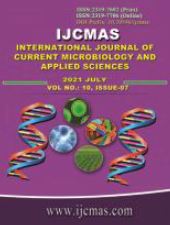


 National Academy of Agricultural Sciences (NAAS)
National Academy of Agricultural Sciences (NAAS)

|
PRINT ISSN : 2319-7692
Online ISSN : 2319-7706 Issues : 12 per year Publisher : Excellent Publishers Email : editorijcmas@gmail.com / submit@ijcmas.com Editor-in-chief: Dr.M.Prakash Index Copernicus ICV 2018: 95.39 NAAS RATING 2020: 5.38 |
To control helminthosporiosis of maize (Zea mays L.) in Côte d'Ivoire, farmers mainly use chemical fungicides. However, these products are very expensive and polluting. This study aimed to propose a biocontrol strategy against the fungal agent Helminthosporium mays using essential oils of two aromatic plants (Eucalyptus citriodora and Ocimum gratissimum). Strains of Helminthosporium mays were isolated from symptomatic leaves of maize. Two maize cultivars (Cultivar jaune de Anyama CJA and Cultivar jaune de Ferké CJF) were inoculated with these fungal strains in a complete randomised Fischer block design with two replicates. The effect of essential oils on the growth of the fungal strains was tested in vitro at different concentrations (500 ppm, 1000 ppm, 3000 ppm and 5000 ppm). A total of six (06) strains of the species Helminthosporium mays were isolated. Two strains SBA and SBI from Bassam and Bingerville were the most virulent. They induced a high mean number of symptoms on the two maize cultivars respectively 25.33 and 26.13 necrotic spots per leaf. The essential oil of the species Ocimum gratissimum was the most effective as it totally inhibited mycelial growth from a concentration of 1000 ppm. This study showed the potential fungicidal effect of essential oils on this phytopathogenic fungal agent.
 |
 |
 |
 |
 |